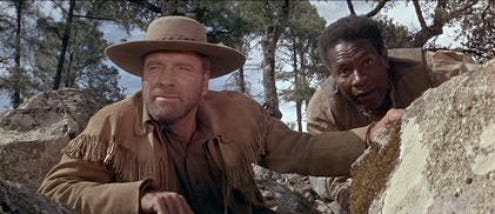The Scalphunters (1968)

One of the pleasures of doing the Reeling Backward column is discovering new talents I hadn't heard about before or rediscovering new aspects of actors and filmmakers with whom I had some familiarity.
I've enjoyed finding more films from Ossie Davis' long movie career and I encountered another delightful performance in 1968's "The Scalphunters." It was Sydney Pollack's third feature film credit after his TV apprenticeship — an enjoyable Western comedy about a grizzled fur trader (Burt Lancaster,) an educated slave out of his element (Davis), some enterprising American Indians with their own peculiar take on capitalism, and the aforementioned scalphunters.
In a previous column, I marveled at Davis' ability to play a young soldier in "The Hill," despite being nearly age 50 at the time. The year "The Scalphunters" came out, Davis turned 51 yet convincingly portrayed a character much younger.
I think I figured out Davis' trick: He simply declined to age until he reached the point in his career that he felt ready to tackle older-man roles. Talk about Method.
Lancaster is ostensibly the lead, Joe Bass, but it's worth nothing that he largely disappears from the center of the movie, residing both literally and figuratively on the periphery of the story. During this time, Joseph Lee, a cagey slave who plays the underhanded motives of the white people against each other, takes the limelight.
In terms of narrative, there isn't much of one. A trapper, Bass has his winter's worth of fur pelts stolen from him by a Kiowa chief named Two Crows (Armando Silvestre, a Mexican actor who makes for a charismatic but unconvincing Indian). As payment, they give him Joseph Lee, whom they had captured from the Comanches.
With Lee in tow, Bass follows the Kiowa with the intent of stealing back his furs. However, the Indians are attacked by a large group of marauders led by Jim Howie (Telly Savalas). Indian scalps are worth $25 apiece, and Howie and his gang are the sort to acquire money in whatever way they can get it. Bass's mule laden with furs is merely a bonus.
After slipping down a cliff wall, Lee is captured by Howie, for whom he figures he'll fetch $1,500 at the slave auction before moving onto Mexico and out of the reach of the long arm of the law. Lee, who realizes slavery is abolished south of the border, begins ingratiating himself with Howie and his mistress, Kate (Shelley Winters), in hopes of accompanying them the entire way to freedom.
Meanwhile, Bass shadows the wagon train, attempting through various means to get back his furs. The most clever of these is poisoning the next water hole with locoweed, so the group's horses bolt and go crazy, killing several men.
Even though there really isn't much going on story-wise, I so enjoyed the four main actors in their roles. Lancaster does his wonderful high-low thing, playing a man of dubious cultural refinement who somehow seems to retain his sense of human grace. He's an illiterate liar who isn't above stealing and fighting dirty, but by gods, he reasons, at least he doesn't trade scalps for a living. The man's stubbornness is his calling card and his curse.
Savalas had one of those careers where he could play lecherous villains and noble heroes, and yet the characters had a similar through-line. His Jim Howie is not a truly dastardly man; he does evil things not because he enjoys them but because they profit him. And profit is all that Howie truly cherishes. Even his relationship to Kate is largely transactional: She figures he's the best chance she's got at a lifetime of comfort, and he gets regular sex and companionship.
It is a marvel to me that anyone, anywhere, at any time ever considered Winters an attractive woman. With a brassy attitude, screechy voice, three chins and a girdle that groans mightily at its task, Kate is a walking study in repulsion. She at least treats Joseph Lee with something like compassion, seeing him as a more refined companion than Jim Howie — especially since he's servile and doesn't hit her.
But Davis' Joseph Lee is the star that makes "The Scalphunters" shine brightly. I loved the way Davis delivers his dialogue — in bright, clipped readings of perfect enunciation and diction. His voice carries almost like he's on a stage and trying to reach the back row.
I shivered with delight whenever he addressed Joe Bass, calling "Mr. Baaasss!!" with a rising crescendo. That over-the-top enthusiasm hides a mountain of obsequiousness, of course, but that is the plight when you are a slave at the mercy of people far less intelligent than yourself.
It could have been just a minor piffle, but Davis and the rest of the cast transform "The Scalphunters" into a joyous comedic reverie on the dusty plains of the West.
4 Yaps



